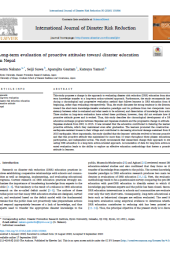Long-term Evaluation of Proactive Attitudes Toward Disaster Education in Nepal
Summary
This study suggests shifting the evaluation of disaster risk reduction (DRR) education from short-term knowledge transfer to a long-term action-based approach. It proposes adopting a chronological and progressive evaluation method that tracks learners' progress from the start of DRR education, rather than retroactively. The study discusses issues with the prevalent short-term evaluation paradigm and presents three long-term evaluation studies that address these problems. It focuses on the development of a DRR education exchange program and the evolving proactive attitude of Nepalese students over a 15-year period, showcasing how education led to sustained proactive behavior even after graduation. The findings emphasize the importance of a long-term action-oriented evaluation approach to foster a lasting proactive attitude among learners.
Categories:
Case Studies
Writer:
Genta Nakano, Seiji Suwa, Aparajita Gautam, Katsuya Yamoria
Link Source:
https://doi.org/10.1016/j.ijdrr.2020.101866
Publisher:
International Journal of Disaster Risk Reduction
Published Year:
2020
